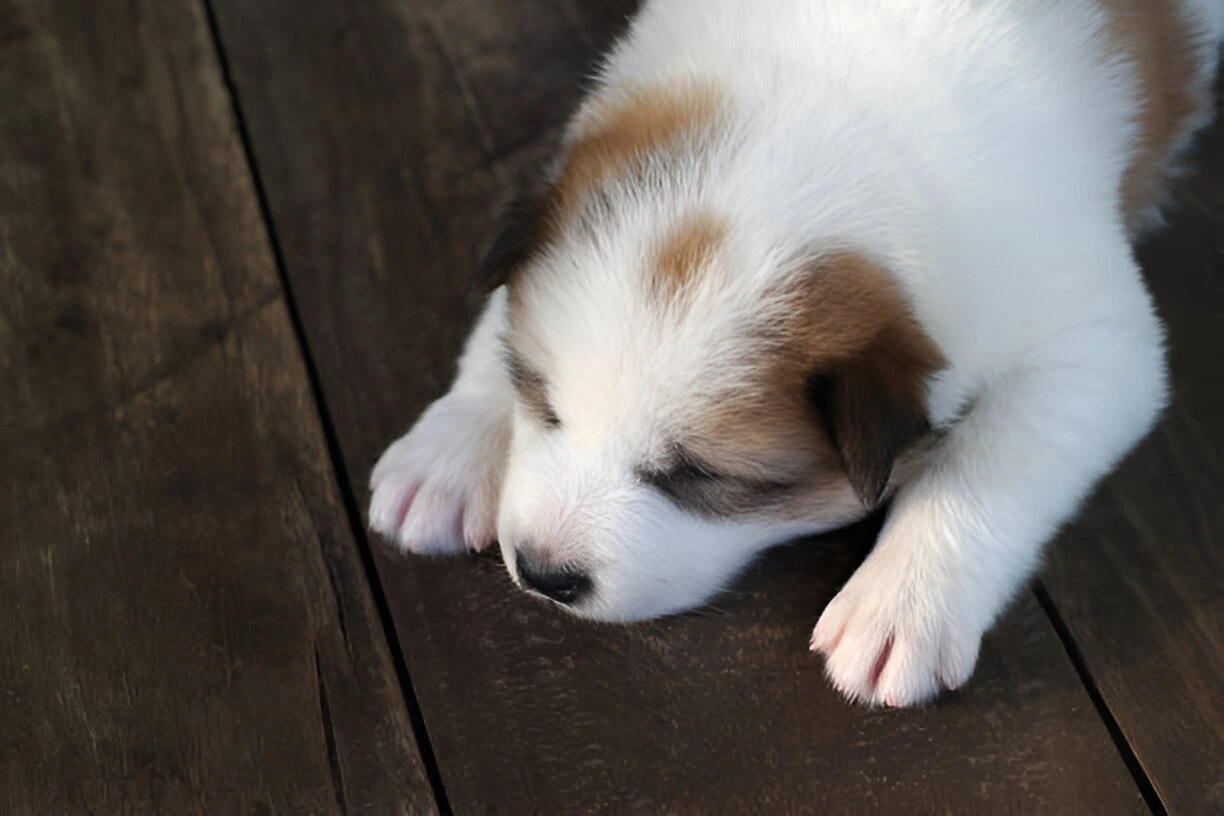Written By Dr Pam, Certified Professional Dog Trainer (CPDT-KA) with 8+ years of experience in puppy behavior. Reviewed by Dr. Masoud Onsori, DVM, of the American Veterinary Medical Association (AVMA).
Hey there, puppy parents! If you’re raising a six-month-old furball, you’ve probably noticed they’re not the tiny, sleepy newborns they once were—but they’re still not quite the chill adult dogs they’ll become.
One question I hear all the time is, “How much sleep do puppies need at 6 months?”
It’s a big deal because sleep isn’t just about keeping them quiet for a few hours—it’s the secret sauce for their growth, mood, and overall health.
Let’s dive into this topic with a conversational vibe, some expert know-how, and real-life insights from puppy owners like you.
By the end, you’ll know exactly how to help your pup catch those Zs like a pro!
Why Do Puppies Sleep So Much?
Puppies are sleep machines, and there’s a darn good reason for it.
Their little bodies and brains are working overtime, and all that snoozing keeps them on track.
Here’s the scoop:
- Growth Mode On: At six months, your pup’s muscles, bones, and brain are still developing at lightning speed. Sleep is when growth hormones kick in, repairing tissues and building strength. Skimp on rest, and their physical progress might hit a speed bump.
- Energy Reload: Between zooming around the yard, gnawing on your favorite slippers, and mastering “sit,” puppies burn serious energy. Sleep recharges their batteries so they’re ready for round two.
- Health Boost: A solid snooze helps regulate stress and powers up their immune system. Without it, your pup could turn into a cranky, sniffly mess.
So, yeah, sleep isn’t optional—it’s puppy fuel!
How Much Sleep Do Puppies Need at 6 Months?
Alright, let’s get to the main event: how much sleep do puppies need at 6 months?
On average, your six-month-old buddy needs 16-18 hours a day.
That’s right—more than half their day is spent dreaming of treats and chasing imaginary squirrels!
It breaks down into two chunks:
Nighttime Sleep: The Big Rest
Most six-month-olds can snooze through the night—think 8-10 hours of uninterrupted shut-eye.
If you’ve been consistent with potty training, those midnight wake-ups are probably fading (hallelujah!).
Some might still need a quick pee break, but they’ll settle back down fast.
Daytime Naps: Power Breaks
The rest of that 16-18 hours—about 6-8 hours—comes from naps.
Puppies are nap ninjas, crashing out after playtime, meals, or just because the couch looks cozy.
These little breaks keep them from turning into overtired terrors.
What Affects Their Sleep?
Not every pup follows the same sleep playbook.
Here’s what can tweak their snooze time:
- Breed and Size: Big breeds like Labs or Newfoundlands might log more sleep since they’re growing into giants. Smaller pups like Yorkies or Dachshunds might lean toward the lower end of the range—they’ve got less mass to build and tons of spunk to spare.
- Activity Levels: A romp in the park or a training session tires them out nicely. But overdo it, and they might get too wired to settle down.
- Sleep Spot: A noisy living room or a lumpy bed can mess with their rest. Quiet and comfy is the goal.
- Health Check: Sudden sleep changes—like way too much or not enough—could hint at something off. A vet visit might be in order if it feels weird.
Crafting the Perfect Puppy Sleep Schedule
Want your pup to sleep like a champ? A routine is your best friend.
Here’s a sample schedule for a six-month-old:
- 7 AM: Wake up, potty, breakfast, and some play.
- 9 AM – 11 AM: Morning nap (1-2 hours).
- 12 PM: Lunch, a quick walk, then a solid 2-3 hour midday nap.
- 3 PM – 5 PM: Playtime or training, followed by a short nap.
- 7 PM: Dinner and chill vibes, maybe a light evening rest.
- 10 PM – 7 AM: Bedtime—8-10 hours of sweet dreams.
Pro Tips for Sleep Success
- Stick to It: Consistent wake-ups and bedtimes sync their internal clock.
- Tire Them Out: Play or train before naps to make sleep irresistible.
- Calm Before Bed: Skip the wrestling match—opt for cuddles or a slow stroll instead.
Expert Tips from the Pros
I tapped Dr. Pam Johnson, a veterinarian with 15 years of experience, for her take. “At six months, puppies are in a growth spurt, and sleep is non-negotiable,” she says. “If they’re restless, check their environment—too much noise or light can throw them off. And don’t skip exercise; a tired puppy sleeps better.” She also suggests watching for signs of overtiredness, like nipping or whining, and enforcing naps when you see them.
Real Puppy Owner Reviews
Let’s hear from folks in the trenches:
- Maggie, Lab Mom: “My six-month-old, Cooper, sleeps about 17 hours a day. He’s a big boy, so I guess that tracks! The schedule we set—naps after play—keeps him from turning into a tornado.”
- Jake, Beagle Dad: “Scout sleeps closer to 16 hours, but he’s a light sleeper. We moved his crate to a quieter spot, and it’s been a game-changer.”
These real-life stories show how tweaking routines and spaces can make all the difference.
Signs Your Pup’s Sleep Is Off
Most puppies snooze without a hitch, but keep an eye out for these red flags:
- Restless Nights: Trouble settling might mean they’re anxious or overstimulated.
- Sleepy All Day: If they’re zonked even when awake, it could signal a health issue.
- Grumpy Vibes: Irritability or hyperactivity often screams “I need a nap!”
If something feels off, trust your gut and check with your vet.
How to Set Up a Sleep Sanctuary
A good sleep setup can seal the deal. Here’s how:
- Cozy Bed: Pick one that fits—big breeds might love an orthopedic option for joint support.
- Quiet Zone: Dim lights and hush the chaos for quality rest.
- Routine Magic: A wind-down ritual (think gentle pets or a soft “goodnight”) cues them to relax.
Why Sleep Matters at This Age
At six months, your pup’s halfway to adulthood, and sleep is their growth superpower.
It boosts brainpower for training, keeps their body strong, and prevents tantrums (yes, puppies have those too!).
A well-rested pup is happier, healthier, and way easier to live with—trust me on that.
Final Thoughts: Sweet Dreams for Your Six-Month-Old
So, how much sleep do puppies need at 6 months? About 16-18 hours, split between a solid night’s rest and daytime naps.
It’s a lot, but it’s exactly what they need to thrive.
Set up a comfy spot, stick to a schedule, and balance play with downtime.
You’ll end up with a pup who’s ready to tackle the world—or at least the backyard.
Got questions or tips of your own? Drop them below—I’d love to hear how your puppy’s sleep game is going!


